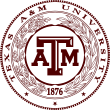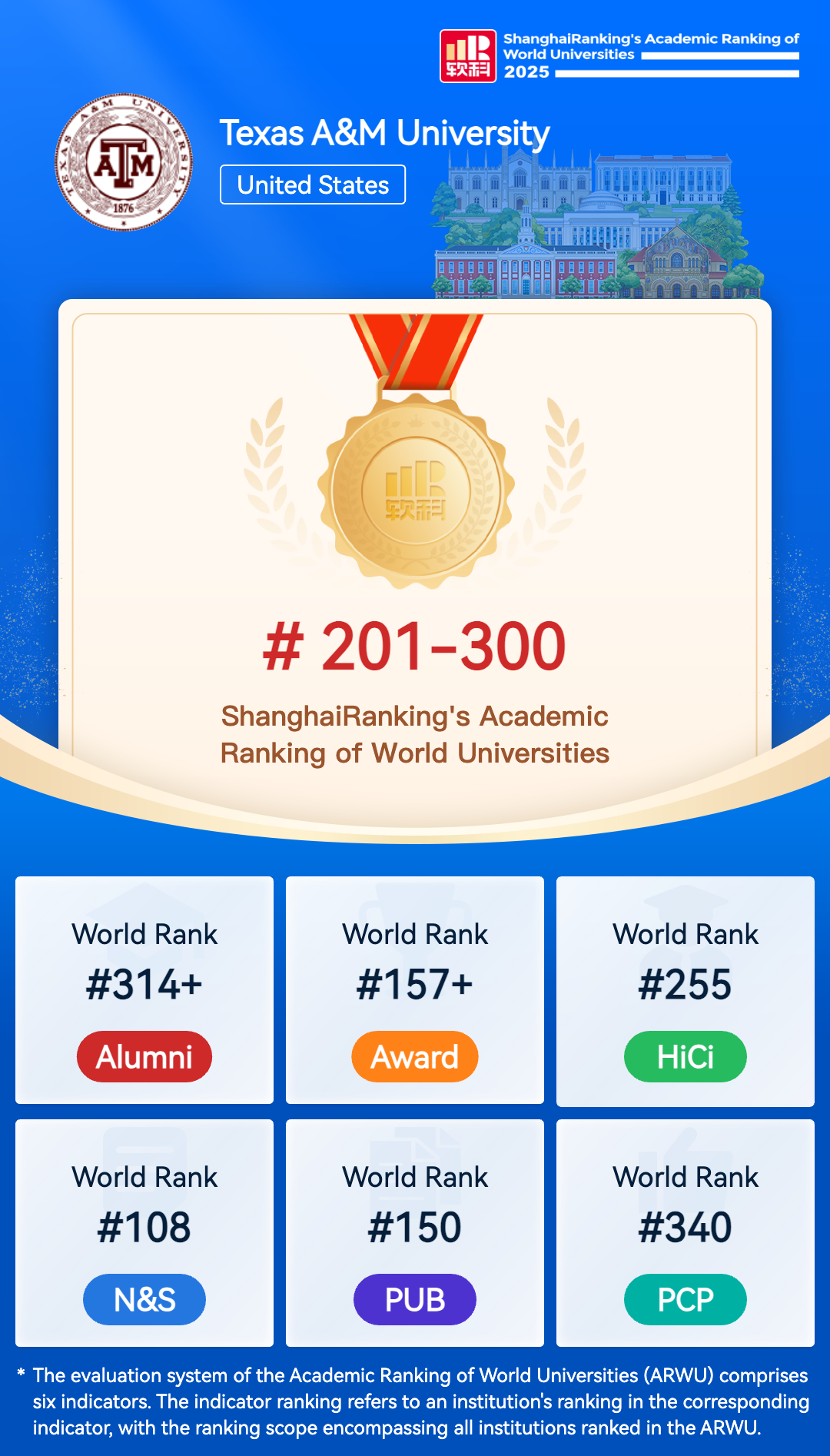 201-300
201-300 


Scope. The flagship of the 18-member Texas A&M University System, Texas A&M University is a tier one research institution, one of only 62 invited members of the Association of American Universities, and one of only 17 holding the federal land-, sea- , and space-grant designation. The state’s first public institution of higher learning, Texas A&M has strategically grown into one of the nation’s most diverse and comprehensive universities, offering nearly 200 undergraduate majors and nearly 245 graduate degree programs, as well as professional degrees in law, veterinary medicine, medicine, dentistry, nursing, pharmacy, and public health. With a student body of more than 68,600 (with about 63,000 on the College Station campus), Texas A&M ranks among the nation’s largest universities. It has a maritime branch campus in Galveston, Texas, and an engineering branch campus in Doha, Qatar, and centers in Mexico and Costa Rica. Academic Excellence. Texas A&M is known for providing a world-class education at a reasonable cost. Twenty-six percent of the student body are the first in their family to attend college, and nearly 60 percent are in the top 10 percent of their high school graduating class. Texas A&M ranks second among public universities nationally for enrollment of National Merit Scholars. It consistently ranks among the top 10 universities in the number of science and engineering doctorates awarded, and in the top 20 in the number of doctoral degrees awarded to minorities. Graduates excel in the workforce. Texas A&M ranks in the top 10 nationally for graduates who get well-paid jobs, and is first in Texas (and among the top nationally) for early- and mid-career earnings of graduates. Texas A&M also ranks first (along with other institutions) in the number of Fortune 500 CEOs. Other recent rankings: #1 among all schools nationally in “Great Schools You Can Actually Get Into” (Money) #1 among public universities nationally in the number of students (more than 3,900) engaging in study, research, internship, or volunteer experiences abroad (in more than 150 countries) each year (Institute of International Education) #2 among public universities nationally in “Best Value Schools” (U.S. News & World Report) #2 among public universities nationally in “research, service, social mobility and contributions to society” (Washington Monthly) Research. Texas A&M is one of the world’s leading research institutions, with research expenditures of more than $892 million in fiscal year 2016. The National Science Foundation ranks Texas A&M 16th in the nation for total research and development expenditures for fiscal year 2015, at more than $866 million, and sixth in the nation in NSF funding. Texas A&M researchers conduct studies on every continent, with more than 600 initiatives underway in more than 80 countries. Texas A&M faculty include three Nobel laureates and 53 members of the National Academy of Sciences, National Academy of Engineering, National Academy of Medicine, American Academy of Arts and Sciences, American Law Institute, or American Academy of Nursing. Texas A&M faculty and students work on practical solutions to real-world challenges, including sustainable and efficient energy, designing and protecting the environment, improving economic development, and enhancing human, animal, and plant health. Examples include the following: College of Veterinary Medicine & Biomedical Sciences, the only veterinary college in Texas, conducts advanced research in signature areas of biomedical genomics, cardiovascular sciences, infectious diseases, neuroscience, reproductive biology, toxicology, and veterinary clinical research. The College is pioneering the study of human cancer using the Texas A&M-Texas Veterinary Cancer Registry for pets diagnosed with cancer, the model for the National Veterinary Cancer Registry. Giant Magellan Telescope Organization (of which Texas A&M is one of 11 international partners) is constructing the largest optical telescope in the world, scheduled to become fully operational by 2024, in Chile. International Ocean Discovery Program (IODP) is an international marine research collaboration dedicated to advancing scientific understanding of the Earth through drilling, coring, and monitoring the subsea floor. The research enabled by IODP improves our understanding of climate and ocean conditions, the origins of ancient life, the risks posed by geohazards, and the structure and processes of Earth’s tectonic plates and uppermost mantle. IODP began in 2013 and builds on four previous scientific ocean drilling programs that represent the longest-running and most successful international Earth science collaboration. Center for Innovation in Advanced Development and Manufacturing, founded in 2012 on an initial $285.6 million public-private partnership with the U.S. Department of Health and Human Services, enhances the nation’s emergency preparedness against emerging infectious diseases, including pandemic influenza and chemical, biological, radiological, and nuclear threats. Center researchers accelerate vaccines and other medical products through pre-clinical and clinical development and produce them in response to pandemics or other national emergencies. Cyclotron Institute, one of only four such university-based, U.S. Department of Energy-funded laboratories, is home to one of a handful of K500 superconducting cyclotrons worldwide, with an unmatched capability for research in nuclear physics and nuclear chemistry. It also serves as a technical support base for collaborative research programs at other major national and international accelerator facilities. Institute for Infectious Animal Diseases collaborates with agricultural industries, major research universities, the national laboratories, and the World Organization for Animal Health to provide early detection, diagnosis, prevention, response, and recovery as needed to protect the U.S. food supply, through funding from three federal departments: Homeland Security, Agriculture, and Defense. English Language Learning and Acquisition, established in Texas A&M’s College of Education and Human Development through a $16.3 million grant from the U.S. Department of Education, supports and promotes the college’s ongoing, nationally known programs on closing the achievement gap between English-language learners and their native English-speaking classmates. Texas A&M helps implement research solutions that improve lives around the world through a technology commercialization office that manages more than 950 patents and 1,650 patent applications relating to a portfolio of more than 1,950 invention disclosures. The Association of Technology Managers ranks Texas A&M among the top in the nation in the number of active, revenue-generating license agreements. In addition, Princeton Review ranks Texas A&M in the top 20 universities nationally for entrepreneurship at the undergraduate level.
 201-300
201-300 
| Subject | Rank |
|---|---|
Management | 3 |
Mechanical Engineering | 6 |
Water Resources | 6 |
Business Administration | 13 |
Agricultural Sciences | 17 |
Aerospace Engineering | 24 |
Statistics | 26 |
Education | 26 |

